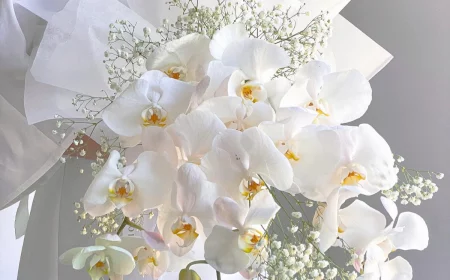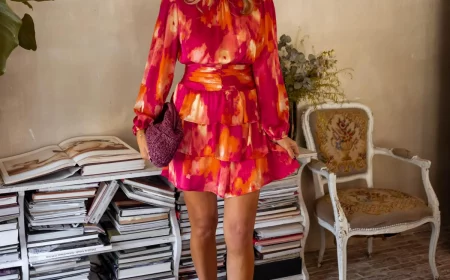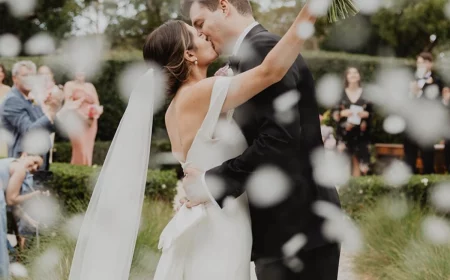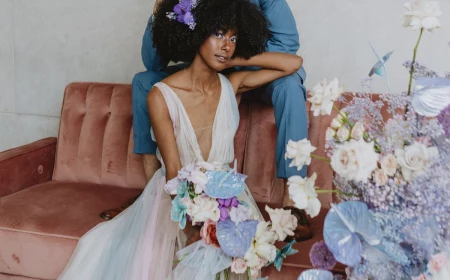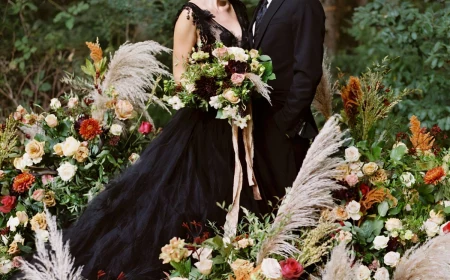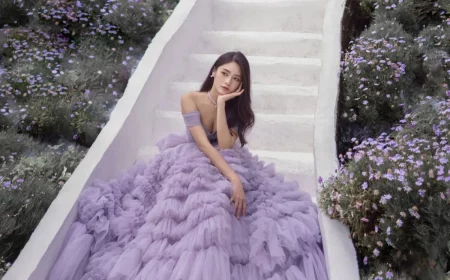The Real-Deal Guide to Picking a Flower Girl Dress That Isn’t a Total Nightmare
I’ve been in the wedding world for a long, long time. And after helping hundreds of families, I can tell you that the difference between a happy flower girl and one having a full-blown tantrum often boils down to one thing: her dress. Not just how it looks in photos, but how it feels, fits, and actually functions for a kid.
In this article
- First Things First: A Kid Isn’t a Mini-Adult
- Let’s Talk Fabrics (The Most Important Choice You’ll Make)
- How to Get the Fit Just Right
- Styling: Making It All Work Together
- The Pro’s Safety Checklist (Learned the Hard Way)
- My “Day-Of” Lifesaver Kit
- Let’s Have the Money Talk
- Final Thoughts: It’s About Joy, Not Perfection
- Inspiration Gallery
Let’s be honest, picking a flower girl dress is more than just finding a tiny white gown. It’s a tricky mix of matching your wedding’s style, being practical, and understanding a little bit of kid psychology. A beautiful dress can make her feel like a princess, but an uncomfortable one can absolutely ruin her day—and a key moment of your ceremony. So, my goal here is to share what I’ve learned from all the fittings, last-minute fixes, and chats with worried parents. We’re going to get into the nitty-gritty details that ensure your flower girl is happy, comfy, and ready for her big moment.

First Things First: A Kid Isn’t a Mini-Adult
Before we even think about styles and colors, we have to get this straight: a child’s body is completely different from an adult’s. Their tolerance for discomfort is basically zero. You might put up with a stiff fabric or a tight seam for fashion’s sake, but a four-year-old? Not a chance. Understanding this is everything.
Think about it. Her job doesn’t end after the walk down the aisle. She’ll be at the reception for hours, running, jumping, spinning, and probably sitting on the grass. The dress has to survive all that. At the same time, kids have a tough time regulating their body temperature. Heavy, synthetic fabrics can turn into a personal sauna, especially at a summer wedding. A hot, sweaty kid is a cranky kid. It’s that simple.
Let’s Talk Fabrics (The Most Important Choice You’ll Make)
Walking into a dress shop can be a sea of white and ivory. But the material is what dictates comfort, durability, and cost. Here’s my no-fluff breakdown.

- Tulle: The Classic Ballerina Vibe. This is the stuff that makes those dreamy, poofy skirts. But here’s the catch: not all tulle is the same. The cheap stuff you find in craft stores is stiff, scratchy polyester. You want the soft, pliable nylon tulle used in quality dresses. A key detail? Always, always check for a soft cotton or blended lining. Raw tulle against a child’s legs is a recipe for an itchy disaster. It’s perfect for a formal, ballroom look.
- Organza: Crisp, Light, but Wrinkly. Organza gives you a crisp, structured look without a lot of weight. It’s great for puffy sleeves or A-line skirts. The downside? It wrinkles and snags if you just look at it wrong. Honestly, if you choose an organza dress, just plan on having a steamer on hand the day of the wedding. It’s a bit high-maintenance but offers a lovely, polished look for an indoor ceremony.
- Satin: Luxurious but Demanding. Satin gives you that high-sheen, mini-bride look. Most kids’ dresses use polyester satin, which is durable but not very breathable. My biggest warning with satin is that it shows every single water spot. A single spilled drop can leave a mark until it’s fully cleaned. I usually steer parents of toddlers away from it, but for an older child at a formal evening wedding, it can be stunning. If you go this route, look for a heavier “bridal” or “duchess” satin—it looks and feels much more expensive.
- Cotton & Linen: The Unbeatable Comfort Kings. For a casual, outdoor, or warm-weather wedding, natural fibers are my top recommendation. Think cotton sateen, eyelet, or linen. They’re soft, breathable, and often machine washable (a huge win for parents!). Yes, they wrinkle. My advice? Just embrace it. For a beach or rustic barn wedding, a few wrinkles are part of the charm. It’s a trade-off for a supremely comfortable and happy kid.

How to Get the Fit Just Right
A dress made from the world’s best fabric will still look sloppy if the fit is off. And since kids grow so fast, you need a plan. Don’t just guess their size based on their t-shirts; formal wear is different.
Quick tip: Before you even start shopping, have the flower girl try on her fanciest party dress at home. Watch her move in it for five minutes. Does she pull at the neckline? Complain it’s hot? This simple test will tell you exactly what fabrics and styles to avoid.
When you’re ready to measure, you’ll need three numbers:
- Chest: Around the fullest part. The tape should be snug, but you should be able to slip a finger underneath.
- Waist: At her natural waist, usually right around her belly button.
- Shoulder to Hem: This is for the length. And I can’t say this enough: floor-length gowns are a huge tripping hazard. A beautiful dress becomes a liability if she can’t walk in it. I always recommend tea-length (mid-shin) or at least a full inch off the ground with her shoes on.
As for when to buy, aim for 2-3 months before the wedding for an off-the-rack dress. This gives you time for alterations without risking a massive growth spurt. For a fully custom dress, you’ll want to start the process 4-5 months out.

Heads up on alterations! Almost every dress will need a little tweaking. But be realistic about the cost. A simple hem on a multi-layered dress can easily run you $30-$50, and taking in the sides might be another $25-$40. Sometimes, the alterations can cost nearly as much as an inexpensive dress, so getting the size right from the start is a huge money-saver.
Styling: Making It All Work Together
Okay, now for the fun part! The dress should feel like it belongs at your wedding. The classic “mini-bride” look is cute, but a more modern approach is to coordinate with the bridesmaids. My favorite trick? Keep the flower girl in a white or ivory dress but add a sash in the same color as the bridesmaid dresses. It ties her to the group while still letting her have her special moment.
And of course, match the dress to the venue. A heavily beaded ball gown looks a little silly at a casual beach wedding. For formal church or ballroom events, go for that structure with tulle or satin. For a garden or barn wedding, think A-line cotton or simple lace. For the beach? Lightweight linen or cotton is a must. Many flower girls just go barefoot for the ceremony on the sand, which solves the shoe problem entirely!

The Pro’s Safety Checklist (Learned the Hard Way)
A child’s safety and comfort are non-negotiable. I have a mental checklist I run through for every single dress, and it’s saved us from a lot of tears.
First, a critical warning: For any child under five, I strongly advise against dresses with sewn-on beads, pearls, or sequins. I’ll never forget a frantic call from a mother whose toddler had pried a faux pearl off the bodice in the car on the way to the church. It’s a serious choking hazard. We switched to recommending embroidered details or high-quality lace for the little ones after that. Also, always feel the inside of the bodice. Scratchy seams or threads can cause a world of irritation.
Second, let’s talk about accessories. For shoes, comfort is the only thing that matters. Think soft, flexible ballet flats from brands known for comfort, like Stride Rite or See Kai Run. Have her wear them around the house to break them in. And always, always have a small, coordinating cardigan or bolero on hand. Churches and reception halls can be chilly, even in summer.

My “Day-Of” Lifesaver Kit
Things happen! I always suggest parents or a designated bridesmaid have a small emergency kit ready to go. It’s a total game-changer.
- A stain remover pen (for the inevitable spill).
- White chalk. This is an old theater trick! For a smudge on a white dress that won’t lift, you can often mask it with a bit of chalk.
- A few safety pins for a broken zipper or torn strap.
- Double-sided fashion tape to fix a gaping neckline or a floppy bow.
- And honestly? A simple, non-messy snack and a bottle of water. Sometimes fussiness is just hunger in disguise.
Let’s Have the Money Talk
Okay, let’s get real about what these dresses cost. You don’t have to spend a fortune, but it helps to know what to expect. For a nice off-the-rack dress at a department store or a reputable online shop (like Janie and Jack for classic looks or David’s Bridal for wedding-specific styles), plan on spending between $60 and $150. If you’re looking at bridal boutiques, the range is typically $150 to $300. A fully custom dress from a designer? That’s where you’ll see prices of $300 and up. Etsy is a fantastic place to find a middle ground, by the way.

And don’t forget the secondhand market! Kids wear these dresses for a few hours, so you can often find them in near-perfect condition. It’s a great way to save money and be more sustainable.
Final Thoughts: It’s About Joy, Not Perfection
After all the planning and prepping, try to remember the real goal. It isn’t to have a flawless photo for a magazine. It’s about creating a joyful memory for you and for a special little girl. If her sash comes untied or she gets a grass stain on the hem, it means she was comfortable enough to just be a kid and have an amazing time. And trust me, a happy, beaming flower girl is the best accessory any wedding could ask for.
Inspiration Gallery



A simple, soft cotton slip or a pair of leggings worn underneath the dress can be a secret weapon. It creates a barrier between sensitive skin and potentially itchy fabrics like tulle or crinoline, ensuring comfort throughout the long day without altering the dress’s appearance.



- Grace and James Kids: For timeless, smocked dresses with a Southern charm. Their classic designs are heirloom quality.
- Feltman Brothers: Renowned for vintage-style dresses with delicate embroidery and hand-sewn details.
- Etsy: The ultimate source for custom and unique designs, from rustic linen frocks to full-blown tulle princess gowns from makers around the world.



What about the shoes?
Comfort is paramount. Forget stiff, patent leather shoes that are sure to cause blisters. Opt for soft leather or canvas ballet flats from brands like Bloch or Capezio, which are designed for movement. For a beach or garden wedding, elegant, well-fitting sandals are perfect. Always have her break them in before the big day!



The ‘twirl factor’ is a scientifically proven phenomenon (among little girls, anyway). A dress with a full, flowing skirt that spins beautifully is often an instant winner.



Important consideration: The closure. A long row of tiny, delicate buttons on the back looks beautiful but is a nightmare to handle with a wriggling child. Look for dresses with a simple zipper, ideally hidden by a fabric placket, or just a few easy-to-manage buttons at the top.



Don’t overlook high-street options. Brands like H&M and Zara often release beautiful occasionwear collections for children that are both stylish and affordable. Their simple, chic linen or cotton dresses can be easily elevated with a custom silk sash or a floral accessory to perfectly match your wedding theme.



Tulle: Lightweight, airy, and creates that classic fairytale look. It can be scratchy, so check for a soft lining.
Organza: Stiffer than tulle, it holds its shape well for more structured designs but can wrinkle easily.
For maximum comfort with a similar floaty feel, look for dresses made with English net or Swiss dot fabric.



- Prevents mid-ceremony meltdowns.
- Keeps the dress pristine.
- Makes her feel special and prepared.
The secret? A ‘Flower Girl Emergency Kit.’ Pack a small, cute bag with essentials: a stain-remover pen (Tide to Go), white chalk to cover last-minute smudges, safety pins, clear nail polish to stop stocking runs, and a small, non-messy snack.



According to a 2022 survey by The Knot, 35% of couples are now opting for flower girl dresses in colors other than white or ivory to better coordinate with the overall wedding palette.
This trend allows for more personality and creativity. Think dusty blue for a coastal wedding, soft blush for a romantic theme, or even a subtle floral print for a garden party. It creates a cohesive look with the bridesmaids while still letting the flower girl stand out.



Before the wedding day, take these simple steps to ensure maximum comfort:
- Snip out all the scratchy internal tags.
- If the fabric allows, wash the dress once with a gentle, hypoallergenic detergent to soften it.
- Have her wear the dress around the house for at least 30 minutes to spot any potential points of irritation.



Can we rent a flower girl dress?
Absolutely! This is a fantastic budget-friendly and sustainable option, especially if you desire a high-end designer look. Services like Rainey’s Closet or Borrow Mini offer exquisite dresses from brands like Doloris Petunia or Tutu du Monde for a fraction of the retail price.



Think about the season. For a winter wedding, a dress in a luxurious fabric like velvet or taffeta, perhaps with long sleeves or paired with a faux-fur capelet, is both beautiful and practical. For a summer celebration, breathable fabrics like cotton eyelet, linen, or dotted swiss will keep her cool and comfortable.



The tradition of flower girls dates back to Ancient Rome, where young attendants carried sheaves of wheat and herbs to symbolize fertility and prosperity for the couple.



A common mistake: Buying the dress too early. Children have unpredictable growth spurts. To avoid a dress that’s suddenly too short or too tight, aim to purchase it no more than 2-3 months before the wedding. Always buy a size up if you’re unsure, as it’s much easier to take a dress in than to let it out.



Let her have a say in the decision, even a small one. Offering her a choice between two or three pre-approved dresses or letting her pick the color of her sash can make her feel involved and much more excited to wear the final outfit. It transforms the dress from a costume into ‘her’ special dress.



- A unique, custom look.
- A perfect fit for non-standard sizes.
- A direct connection with the creator.
The secret? Shopping on Etsy. You can find independent designers who will create a dress to your exact measurements and style specifications, often using high-quality materials for a surprisingly reasonable price.



Boho Style: Think soft, flowing lace, empire waists, and crochet details. These dresses, often found on sites like BHLDN or from indie designers, pair beautifully with flower crowns and sandals for a relaxed, whimsical wedding.
Classic Style: Look for A-line silhouettes, crisp satin or taffeta, and elegant details like a large bow or a Peter Pan collar. Brands like Janie and Jack often nail this timeless, formal look.



What do we do with the dress afterwards?
Instead of letting it sit in a closet, give it a second life. It can be professionally cleaned and stored as a family heirloom, dyed a different color to be used for other parties, or donated to a charity like The Princess Project, which provides formalwear to teens in need.



Remember Princess Charlotte’s dress at Pippa Middleton’s wedding? The classic, smocked design by Pepa & Co is a perfect example of timeless elegance that avoids fleeting trends.



If you have multiple flower girls of different ages, don’t feel pressured to put them in identical dresses. A more modern approach is to choose a single color or fabric and let each girl wear a style that is comfortable and age-appropriate for her. This creates a beautifully coordinated, yet natural, look.



- Help, it’s too big! A decorative ribbon or sash is the quickest way to cinch a loose waist. For a quick hem, fabric tape like Hollywood Fashion Tape works wonders.
- A sudden tear? A few well-placed safety pins on an inside seam can hold things together until after the photos.



The ‘underlayer’ is key. The softest, most beautiful lace or tulle dress can be rendered unwearable by a cheap, stiff polyester lining. When shopping, always feel the inside of the dress. A soft cotton or jersey lining is a sign of a well-made, comfortable garment.



For toddlers (1-3 years): Prioritize safety and simplicity. Avoid floor-length gowns they can trip on. Tea-length is ideal. Look for dresses with minimal embellishments like beads or sequins that could become choking hazards.
For young children (4-7 years): This is the prime age for the ‘princess’ fantasy. Fuller skirts and special details are a hit, but comfort remains essential for running and playing at the reception.



A child’s skin is up to 30% thinner than an adult’s, making it significantly more sensitive to irritation from rough fabrics and chemical residues.
This is why opting for natural, breathable fabrics like cotton, linen, or silk is more than just a style choice—it’s a practical decision for her well-being. If you choose a synthetic like polyester, ensure it has a soft, natural-fiber lining.

Don’t forget the accessories! A simple dress can be transformed with the right extras. Consider a delicate faux-fur stole for a winter wedding, a handmade floral crown that matches the bride’s bouquet, or a small, personalized basket. These details complete the look and make the experience more magical for her.

